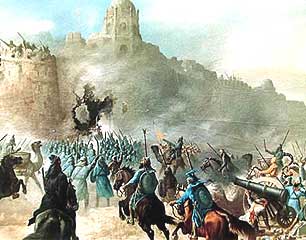Wednesday
The New Yorker offers a remarkable series of fiction and poetry podcasts where authors read and discuss previous works that have appeared in the magazine. Fiction writers choose a short story while poets pick two poems, one by someone else and one by themselves.. The conversations are thoughtful and very illuminating.
Poet Stephen Dunn recently selected a Richard Justice poem, “There is a gold light in certain old paintings,” and then read his own “History.” Both poems are wonderful but I found myself focusing especially on “History” as it captures how history operates as a series of stories. It also applies to the various narratives that we are seeing played out in our presidential primaries.
The poem, which has the resonance of a fairy tale, features three narratives. In the first, the king marries a commoner, which “causes widespread dreaming and a general hopefulness.” “A strange democracy,” the poet tells us, “radiates throughout the land.”
The second narrative describes a conservative reaction: the queen is locked in a tower and the king “issues an edict that all things yours/are once again his.” This is how, we are told, history gets its “ziggy shape.”
And then there is another reaction and the pendulum swings again with a rebellion against tyranny. I particularly like Dunn’s description of the activist who leads it. Our heroes are often not ones we would pick, nor do they choose the best time for their rebellion. It’s never the right time because the right time “never arrives.” Nevertheless, they are what we have and sometimes they have an impact:
There’s only
that one person, not exactly brave,
but too unhappy to be reasonable,
who crosses the moat, scales the walls.
Here’s the poem:
History
By Stephen Dunn
It’s like this, the king marries
a commoner, and the populace cheers.
She doesn’t even know how to curtsy,
but he loves her manners in bed.
Why doesn’t the king do what his father did,
the king’s mother wonders—
those peasant girls brought in
through that secret entrance, that’s how
a kingdom works best. But marriage!
The king’s mother won’t come out
of her room, and a strange democracy
radiates throughout the land,
which causes widespread dreaming,
a general hopefulness. This is,
of course, how people get hurt,
how history gets its ziggy shape.
The king locks his wife in the tower
because she’s begun to ride
her horse far into the woods.
How unqueenly to come back
to the castle like that,
so sweaty and flushed. The only answer,
his mother decides, is stricter rules—
no whispering in the corridors,
no gaiety in the fields.
The king announces his wife is very tired
and has decided to lie down,
This is the kind of law
history loves, which contains
its own demise. The villagers conspire
for years, waiting for the right time,
which never arrives. There’s only
that one person, not exactly brave,
but too unhappy to be reasonable,
who crosses the moat, scales the walls.
Think of the first story as the dream of hope and change. Indeed, Obama’s election (and, on the right, Sarah Palin’s selection) inspired “widespread dreaming, a general hopefulness.” The second is a smashing of our hopes, which at some level we expected (“this is the kind of law history loves”). The third is another swing back as once again we experience hope.
In our current presidential primaries, maybe the first involves those dreaming that our candidates will lift us up into prosperity, the second the inevitable disillusion as the status quo reasserts itself as the laws of history decree it will, and the third the unlikely success of candidates who are too dissatisfied with America to be reasonable (Sanders, Trump).
Who know where our zigzagging history will take us next?
